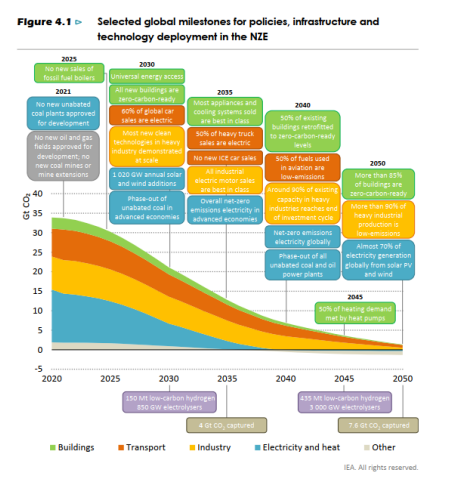Letter
Brussels, 29 September 2021
To:
President and co-president of the Union for the Mediterranean,
Secretary General Mr Nasser Kamel,
Deputy Secretary General on Energy & Climate Action Mr Grammenos Mastrojeni,
Representatives from Member States,
Senior Officials,
Mediterranean energy, gas, and climate policies
Dear sirs/madams,
The publication of the International Energy Agency (IEA) Net Zero by 2050 Roadmap for the Global Energy Sector in May 2021 was a watershed moment for global climate action. The report maps out concrete milestones that need to be met to enable a 2050 world with net zero emissions and limit global temperature rise to 1.5 °C.
Ahead of your Second UfM Ministerial Conference on Environment and Climate Action to be held in Cairo, October 4th, we invite you to reflect on its findings. The IEA report finds that in order to limit global temperature increase to 1.5°C, we must ensure:
• No more investment in new fossil fuel supply: As the Executive Director of the IEA put it: “there is no need for new oil, gas and coal development, which includes no need for oil and gas exploration investments.”
• Mainstreaming of Renewable electricity: Electricity generation must be 100% zero-emission in the OECD by 2035, and globally by 2040. This means a phase out of all oil and gas-fired power plants within the same timeframes (while coal-fired power has to be phased out sooner).
• No new fossil fuel boilers sold from 2025.
These IEA findings confirm once and for all that new gas investments cannot be deemed compatible with a 1.5°C pathway. In addition, given that the average lifespan of gas-fired plants is 25 years, it makes clear that there is no place in the carbon budget for any new fossil gas pipelines, infrastructure and gas-fired plants producing electricity or heat to be installed between now and 2035.
This has serious implications for the Mediterranean: given that gas power should be quickly phased out in the IEA 1.5°C scenario, gas cannot be promoted anymore by the UfM policies, as it is currently the case through the UfM Gas Platform, among other pro-fossil fuel initiatives.
In addition, it should be noted that the IEA’s findings on fossil gas are consistent with the last reports from the Mediterranean Experts on Climate Change (MedECC) and the State of Environment and Development (SoED) highlighting the extreme impacts of global warming in the region and the need for an urgent energy transition towards climate neutrality.
With COP26 nearing, we therefore call on you to phase out fossil energy support in the UfM policies: It would ruin the UfM credibility to fight climate change, undermine Member States’ Energy Efficiency and Climate policies, and send a disastrous global signal at odds with the urgent need for climate mitigation and adaptation efforts.
Many countries are already aiming to phase out emissions from the power sector by 2035, which is consistent with the IEA report. The UfM must now send a coherent signal, with its own policies and initiatives to reach climate neutrality by 2050 in the Mediterranean region. The Annex of this letter provides more evidence on electricity and heat sectors from the IEA Net Zero report.
We will be happy to have a sincere discussion on this topic with the UfM secretariat to explore how we can support the Energy Transition in the region and interact with your Climate, Renewable Energy and Energy Efficiency Platforms and Working groups.
With our best regards,
Signatories:
1. CAN Europe, Wendel Trio, Director
2. CAN Arab World, Hamza Oudghiri, Chairman
3. MIO-ECSDE, Michael Scoullos, Chairman
4. Transport & Environment, William Todts, Executive Director
5. Greenpeace Mediterranean, Ersin Tek, Executive Director
6. Greenpeace MENA, Ghiwa Nakat, Executive Director
7. WWF Mediterranean, Paolo Lombardi, Director
8. eco-union, Jeremie Fosse, President
9. Ecologistas en Acción, Sagrario Monedero, Gas Campaigner
10. ZERO – Associação Sistema Terrestre Sustentável,Francisco Ferreira,
President of the Board
11. Genç Düşünce Enstitüsü (Young Thought Institute), Muratcan Işıldak,
General Director
12. Fundación Renovables, Raquel Paule, Executive Director
13. Yuva, Erdem Vardar, Director
14. Human Environmental Association for Development HEAD, Marie
Therese Merhej Seif, Chairman & Executive director
15. EKOenergy ecolabel, Steven Vanholme, Programme Manager
16. Yesil Gelecek Dernegi, Bilgesu Yilmaz, Director
17. Nature Trust Malta-FEE, Vincent Attard, President
ANNEX: Excerpts from the IEA Net‐Zero Emissions Scenario (NZE) by 2050
• Fossil fuel use falls drastically, and no new oil and natural gas fields are required beyond those that have already been approved for development. (Page 99)
• There are no new fossil fuel boilers sold from 2025, except where they are compatible with hydrogen, and sales of heat pumps soar. (Page 99)
• By 2050, electricity provides 66% of energy use in buildings (33% in 2020) and natural gas use for heating drops by 98%. (Page 99)
• Fossil fuel use in the buildings sector declines by 96% and space heating energy needs by two-thirds to 2050, thanks mainly to energy efficiency gains (Page 143)
• Homes heated by natural gas to fall from nearly 30% of the total today to less than 0.5% in 2050 (Page 145)
• High efficiency electric heat pumps become the primary technology choice for space heating (Page 145)



